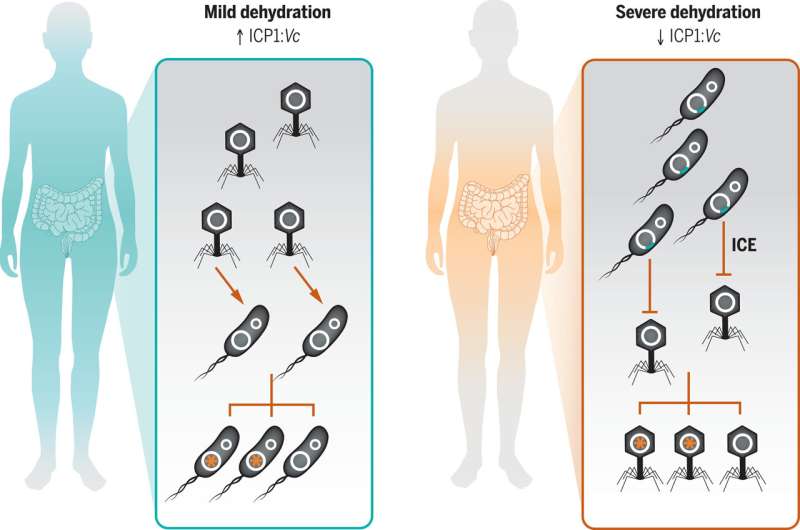This article has been reviewed according to Science X's editorial process and policies. Editors have highlighted the following attributes while ensuring the content's credibility:
fact-checked
peer-reviewed publication
trusted source
proofread
Study underscores new strategies to fight drug-resistant bacteria

Several billion years ago, a genetic arms race began between bacteria and their viral killers. This seemingly eternal struggle continues today, with implications for diseases killing tens of thousands of people around the world each year.
A recent study published in Science reveals key insights into how bacteria killers called bacteriophages or phages impact the severity of the waterborne diarrheal disease cholera. Cholera kills between 21,000 and 143,000 people annually worldwide. It is a disease of poverty, striking regions lacking clean drinking water and sanitation.
The team, including McGill University Microbiology and Immunology Professor Jesse Shapiro, conducted what it believes to be one of the largest genetic studies to analyze the dynamic relationship between cholera bacteria, their bacteriophages and antibiotics.
The study underscores the possibility of creating new strategies to use bacteriophages to kill drug-resistant bacteria in cholera and other diseases that have plagued civilization for centuries. It reveals a pathway to new diagnostics and antibiotic resistance mitigation.
"Cholera is a devastating waterborne infection that causes millions of cases and thousands of deaths each year, with risk expected to increase with climate change. Antibiotic resistance is also an increasing concern and alternative anti-infection treatments are needed," said Shapiro.
Effective predation
A key finding involves a concept called "effective predation." The researchers found a higher ratio of phage predators to their bacterial prey was associated with milder cholera cases. The team said it is the first to show the genetic underpinnings of this ratio.
This ratio can be used as a marker of disease severity, informing a physician's decisions on treatment. It might also predict disease progression.
The researchers used advanced genomic techniques to analyze the interaction of bacteria and the bacteriophages in 2,574 stool samples from cholera patients in Bangladesh, a nation with one of the world's highest cholera rates—about 100,000 cases yearly. Samples were collected in 2018 and 2019.
Shapiro conducted a genetic analysis of samples with the study's lead author, Naïma Madi, Ph.D., a postdoctoral researcher at McGill.
Documenting the genetic arms race between the bacterium and its phages complicates the study of cholera and phage ecology. Each evolves to thwart the other's defenses. One adapts, the other responds. If the phages have the upper hand, the genetic diversity of the bacteria increases. Then, the population of phages falls. The virus responds with genetic adaptations, eventually thriving again.
Shapiro said more studies, including a clinical trial, are needed before effective phage therapies are developed.
More information: Naïma Madi et al, Phage predation, disease severity, and pathogen genetic diversity in cholera patients, Science (2024). DOI: 10.1126/science.adj3166
Journal information: Science
Provided by McGill University

















